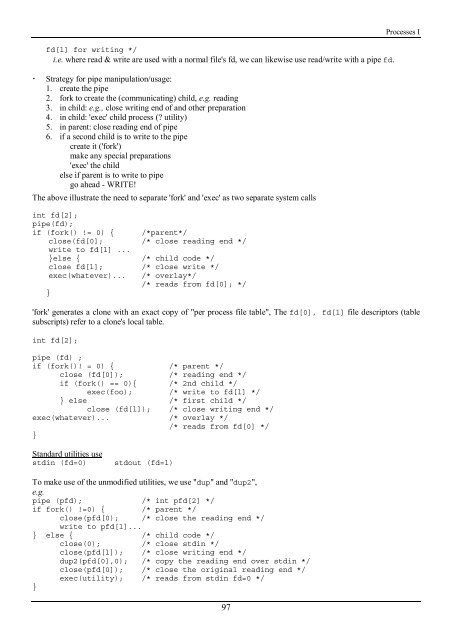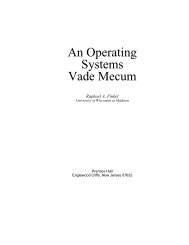Create successful ePaper yourself
Turn your PDF publications into a flip-book with our unique Google optimized e-Paper software.
fd[l] for writing */<br />
i.e. where read & write are used <strong>with</strong> a normal file's fd, we can likewise use read/write <strong>with</strong> a pipe fd.<br />
! Strategy for pipe manipulation/usage:<br />
1. create <strong>the</strong> pipe<br />
2. fork to create <strong>the</strong> (communicating) child, e.g. reading<br />
3. in child: e.g., close writing end of and o<strong>the</strong>r preparation<br />
4. in child: 'exec' child process (? utility)<br />
5. in parent: close reading end of pipe<br />
6. if a second child is to write to <strong>the</strong> pipe<br />
create it ('fork')<br />
make any special preparations<br />
'exec' <strong>the</strong> child<br />
else if parent is to write to pipe<br />
go ahead - WRITE!<br />
The above illustrate <strong>the</strong> need to separate 'fork' and 'exec' as two separate system calls<br />
int fd[2];<br />
pipe(fd);<br />
if (fork() != 0) { /*parent*/<br />
close(fd[0]; /* close reading end */<br />
write to fd[l] ...<br />
}else { /* child code */<br />
close fd[l]; /* close write */<br />
exec(whatever)...<br />
}<br />
/* overlay*/<br />
/* reads from fd[0]; */<br />
Processes I<br />
'fork' generates a clone <strong>with</strong> an exact copy of "per process file table", The fd[0], fd[l] file descriptors (table<br />
subscripts) refer to a clone's local table.<br />
int fd[2];<br />
pipe (fd) ;<br />
if (fork()! = 0) { /* parent */<br />
close (fd[0]); /* reading end */<br />
if (fork() == 0){ /* 2nd child */<br />
exec(foo); /* write to fd[l] */<br />
} else /* first child */<br />
close (fd[l]); /* close writing end */<br />
exec(whatever)... /* overlay */<br />
/* reads from fd[0] */<br />
}<br />
Standard utilities use<br />
stdin (fd=0)<br />
stdout (fd=l)<br />
To make use of <strong>the</strong> unmodified utilities, we use "dup" and "dup2",<br />
e.g.<br />
pipe (pfd); /* int pfd[2] */<br />
if fork() !=0) { /* parent */<br />
close(pfd[0); /* close <strong>the</strong> reading end */<br />
write to pfd[l]...<br />
} else { /* child code */<br />
close(0); /* close stdin */<br />
close(pfd[l]); /* close writing end */<br />
dup2(pfd[0],0); /* copy <strong>the</strong> reading end over stdin */<br />
close(pfd[0]); /* close <strong>the</strong> original reading end */<br />
exec(utility); /* reads from stdin fd=0 */<br />
}<br />
97
















